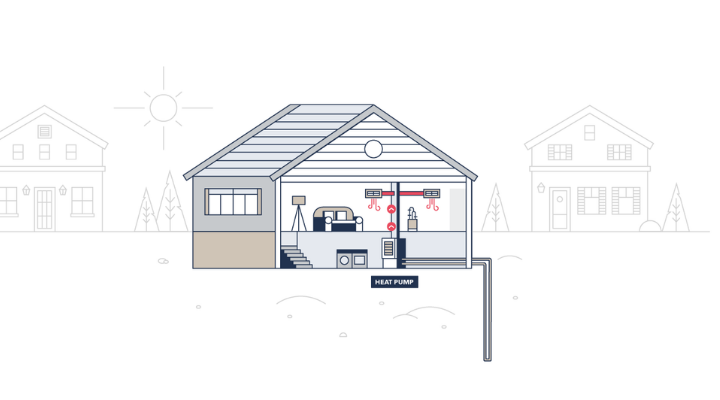If you’re passionate about sustainable, renewable energy produced by and sourced from the earth, you likely have heard about geothermal energy.
As utility bills and home care costs rise, more and more people are becoming interested in alternative methods of home maintenance. Geothermal heat pumps are one of those methods, and for good reason! Keep reading for everything you should know about geothermal heat pumps.
This central system of heating and cooling taps into the ground temperature (which is warmer in the winter and cooler in the summer) to circulate air in the home. Unlike classic furnaces and boilers, many geothermal heat pumps can both heat and cool the home. Geothermal heat pumps are made up of two main components:

How does it work? Simply put, geothermal heat pumps “pull” the warm air from the ground during cold months to heat your home, and pump hot air back into the earth during warm months. The system utilizes a water-based solution for circulation.
The best part: because the earth maintains a consistent 50 degrees below the frostline year round, no matter the season, geothermal heat pumps can be installed in any climate, in any location.
One of its best features, geothermal heat pumps boast one of the highest efficiency rates in the HVAC industry. For every one unit of energy used to power the system, four units of energy are supplied to your home through either heating or cooling. This is a 400% efficiency rate. Even the newest, highest-efficiency furnaces only claim a rate of 96% efficiency on average.
Additionally, geothermal heat pumps last up to 25 years, and require electricity for power. In the case of a power outage, ensure your home has a backup generator.
Which geothermal system suits your needs best? Depends on what you have available, and the kind of property where you reside!
As with any HVAC system, geothermal heat pumps require regular maintenance and upkeep to function at optimal efficiency.
Geothermal heat pumps don’t come cheap.
They will save money and produce more efficiency than any other system in the industry, but to no surprise for experts in HVAC, it comes at a cost upfront. While there are variations in price due to the size of the project or home, the average cost of a geothermal heat pump installation is $20,000.
While the initial investment can be a deterrent for some homeowners, be assured: if you can afford to install one, a geothermal heat pump will save up to 50% on your heating and cooling costs year-round.
Who can install a geothermal heat pump in your home? Only some HVAC companies service geothermal equipment in your home. If you're looking for a trustworthy company that does, go online and review their services to see if geothermal is part of them. If it's not directly on their website, try giving them a call to ask.
If you need any assistance with your HVAC system in your home, contact us today. We know HVAC.